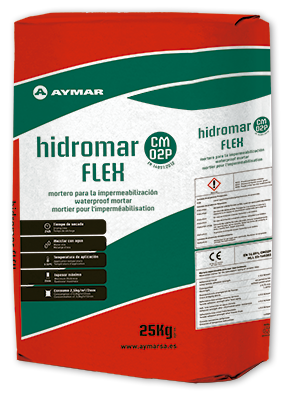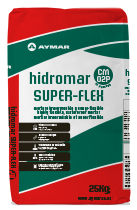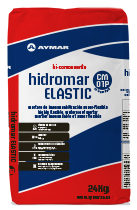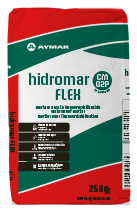Hidromar Flex

Mortar for waterproofing swimming pools, tanks, lift shafts, etc. Flexibility and safety.
GUARANTEED WATERTIGHTNESS:
The watertightness of a swimming pool, tank, etc. is the EXCLUSIVE RESPONSIBILITY of the concrete vessel that forms it, as its construction, stability, dimensioning, concrete quality, ground settlement, crack formation, etc. are not the responsibility of waterproofing with HIDROMAR FLEX. HIDROMAR FLEX waterproofs stable structures, and perfectly withstands the formation of small cracks in the structure, but if the concrete forms cracks, these cracks will ALSO break the HIDROMAR FLEX. For this reason, we recommend ALWAYS carrying out a waterproofing test to ensure the structural stability of the concrete tank before applying HIDROMAR FLEX.
Made in Spain.
- Application field
- Instructions of use
- Technical data
- Waterproofing of swimming pools, ponds, tanks, basements, etc.
- Waterproof protection of surfaces with micro-cracks.
- Prefabricated or/and concrete blocks.
- Protection of external walls of buildings.
- Retaining walls with geotextile sheet protection.
- Tunnels, ditches and irrigation channels.
- Lift shafts. Waterproof even under hydrostatic pressures (e.g. low water table).
- Waterproofing of bathrooms, showers, balconies, etc. for the subsequent laying of ceramic tiles with ADIMAR FLEX.
- Step 1: the substrates must be resistant, solid, clean of dust, paint, waxes, release agents, oils and grease and perfectly set.
- Step 2: prior to the application of HIDROMAR FLEX, we recommend applying a fibreglass mesh in all corners, corners and drains in order to achieve total waterproofing of these critical points.
- Step 3: wet the surface with water until it is saturated, eliminating excess water and avoiding puddling.
- Step 4: to prepare the mortar, mix the entire 25 kg bag with 6.0 litres of clean water. It is mandatory to mix mechanically at low speed to avoid the inclusion of air. The resulting mixture must be completely homogeneous.
- Step 5: apply a 1st coat of HIDROMAR FLEX with a brush or fine trowel or pneumatic spraying system. This layer must be more than 2 mm thick. We recommend applying a 5x5 mm light fibreglass mesh on top of this first coat while the first coat is still fresh. This mesh significantly improves the tensile strength of the waterproofing.
- Step 6: let the 1st layer dry for approx. 4 hours.
- Step 7: apply a 2nd coat of HIDROMAR FLEX perpendicular to the 1st coat
- ATTENTION: we recommend applying at least 2 coats of 1 mm. each in pools or tanks that must contain water at positive pressure up to a maximum of 3 bar and/or negative pressure up to 1.5 bar.
Remember: the more coats, the more protection (always apply coats with a maximum thickness of 1 mm.), therefore for more pressure, increase the number of coats.
LAYING CERAMICS ON HIDROMAR FLEX: After 24 to 36 hours (at +20ºC) from the application of HIDROMAR FLEX, the ceramic pieces should be glued with a cement glue that complies with the regulations for adhesion on waterproof sheets, such as ADIMAR FLEX.
WARNING: HIDROMAR FLEX should not be used:
- At temperatures below +5ºC.
- In thicknesses greater than 1 mm. per layer.
- On surfaces that have not been previously saturated with water (especially on hot days).
- By adulterating the formula or modifying the powder-water ratio.
- On concrete structures that are not stable or subject to possible ground settlement (see Technical Dept.).
- Without first having carried out the watertightness test and having ensured the structural stability of the assembly.
HIDROMAR FLEX is a flexible, single-component, cement-based mortar that protects and waterproofs all types of masonry surfaces, concrete or rendered mortar in the presence of water or damp. Its flexibility allows it to cover the micro-cracks that form in concrete subjected to deformations.
Its unique characteristics differentiate it by its:
- Great adherence to the substrate.
- Total impermeability.
- Ceramic finish possible.
- No shrinkage.
- Excellent workability by brush, fine trowel or roller.
- High mechanical resistance.
- Resistance to the effects of saline and somewhat acidic water, atmospheric pollution by CO2, SO2, ...




